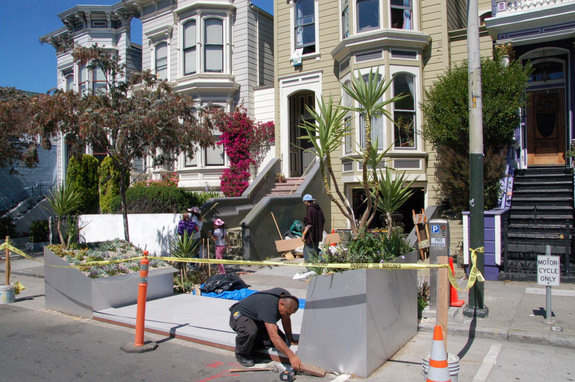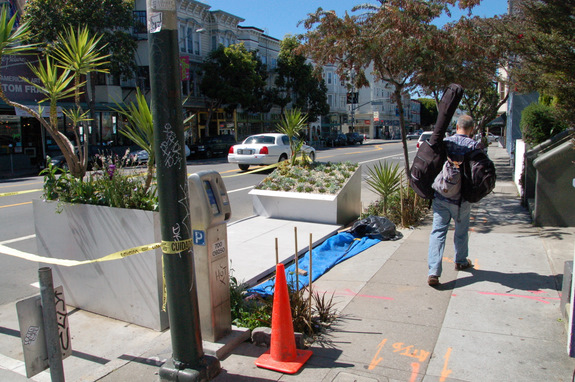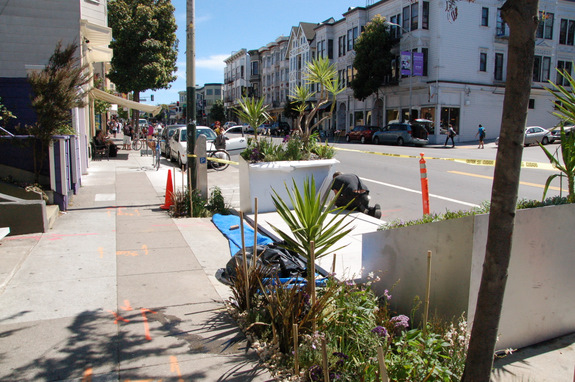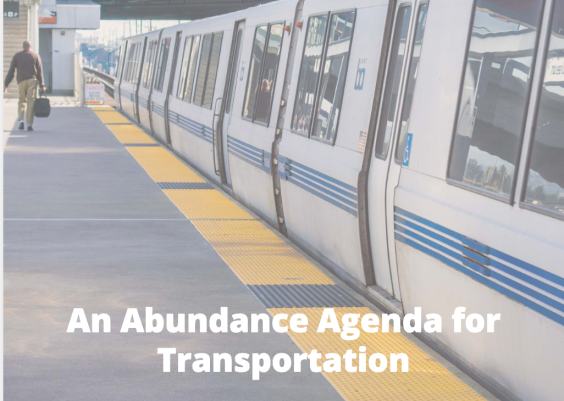
Amandeep Jawa (a.k.a. 'Deep) might be recognized by many San Franciscans as the man who can turn any street into a party as he glides by on his music-booming “Trikeasaurus." As an organizer of events that inject life into the street like the San Francisco Bike Party, he naturally jumped at the chance to create a beautiful social space outside his Valencia Street home with San Francisco’s first residential parklet.
"Valencia is not a great pedestrian street even though it's a great public street," said Jawa. "I wanted the front of my house to reflect the fact that people come and hang out there. In general, that's a great thing, and that's what Valencia's all about. The parklet is a natural extension for that."
Affectionately dubbed the "'Deepistan National Parklet," it will be the first in the city to front a home rather than a business. It'll bring more breathing room, a social resting spot, and an abundance of plant life to a skinny sidewalk. With the help of Jawa's friends and colleagues, its construction is well on its way to completion in time for the grand opening celebration this Sunday.
Jawa decided to create the parklet after he consulted with architect Jane Martin on beautifying the streetfront of his house. She suggested expanding the project by applying for the first round of parklet applications last fall. Jawa loved the idea, and Martin helped him design it.

"I've been a very big fan of Park(ing) Day and parklets since the very first one, and I thought, 'oh my god, that sounds fantastic'," said Jawa. "It also dovetails with a lot of my views and visions for how Valencia Street should be, so it was kind of a no-brainer."
The parklet's design will have a different approach than other parklets, explained Martin. Instead of a protective railing between the parklet and the roadway, it will have an opening in the center to keep it "porous to the bike lane."
"A lot of these parklets put a railing to the 'back' but this really remains open," she said. "For him, he can still get his bicycles and tricycles into the garage, but it's much more flexible. It's not a single-use, it's a multi-use space."
The deck will also extend into the sidewalk to "straddle" the curb cut ramp, resulting in "a bigger feeling that it's a social space more perpendicular to the street as opposed to parallel with it," said Martin. "It's literally counter to traffic, which is really exciting to me."
Benches will be included as extensions of the planters, and designed in a way that encourages shorter use of the space than typical parklets that front businesses. "It's kind of a place to rest your butt, frankly," said Martin. "It's intentionally narrow to encourage people to stay for a short while but not to be there overnight."
It will also have an emphasis on large, low-water plants, she said. "The big planters are really to balance the physical presence of the cars. I feel like a lot of the parklet prototypes we've seen out there are still very diminutive and the hulk of the car still dominates next to a lot of them, so I wanted to give something that was of the street scale."
The parklet's design concept was based on Jawa's personality and vision for a Valencia Street that's more inviting for people to spend time on, said Martin.
Jawa, a member of the SF Bicycle Coalition Board of Directors and president of the League of Conservation voters, said his active involvement in sustainable streets advocacy was born out of his love for Valencia Street and San Francisco, something that happened almost as soon as he arrived here.
"I just felt so lucky to be here and fell in love with it, and I think if you're in love with something, you want to be involved with it," said Jawa.
"He's a very social person, and he's very much into the cultural scene on Valencia Street and a big supporter of pedestrian and bicycle advocacy," said Martin. "I feel that as sort of an extension of his personality and the way it fits with that building, the design is to create a social space in the front of the house as opposed to the back of the house. So, it sort of inverts the typical public/private scenario."
Most of the parklets that continue to pop up around the city have so far been largely motivated by the benefits they bring to businesses, although some come from non-profits. Restaurants and cafes usually take on construction and maintenance duties but benefit by attracting more customers to their storefront.
"You can see the profit motive - and god bless 'em, I'm glad those businesses are there," said Jawa. "But I think if you talk to the business owners, they also get a greater sense of what Valencia could and should be like, and that's why they're on Valencia."

Andres Power of the SF Planning Department said the parklet program welcomes residential applications.
"The intent of the program is for parklets to be as widely used as possible," he said. "The initial interest has primarily been from businesses, but the program is supportive of [residential parklets], and we'd like to see more of it."
The requirements for residential parklets aren't any stricter than for those fronting a business, said Power, granted they're designed appropriately for the environmental context.
"In a residential area, cafe seating isn't what you would necessarily want to see, but landscaping and beautification is," he said. "As long as the design response is right, I think parklets can be a positive attribute to the neighborhood."
Martin noted that while a business-fronting parklet only replaces "general street parking," a residential one is "actually a more direct implication of the model because it means you yourself are giving up the parking because of the curb cut in front of the house."
"For 'Deep, that wasn't difficult because he's long since given up a car," said Martin.
Indeed, with barely half of Mission District households using their required garages to store cars, the potential for more residential parklets seems enormous.
Still, Martin pointed out that they are a major expense for any property owner. Much of the funding for constructing parklets often comes from grants, and merchants typically expect to recoup their costs with the increase in customers, something residents can't do.
But Jawa, a strong advocate of projects to widen sidewalks on Valencia, including the four blocks improved on the corridor last year, is certain the movement to continue pushing into the street will be successful.
"There are more parklets on Valencia than any place in the city. They're just popping up like mad," said Jawa. "But if you look at Valencia, it's a great pedestrian street despite itself. People love walking and love biking there, but in terms of the street amenities, it's kind of hostile to them. You can't walk two people abreast."
For now, as one more piece of the street is reclaimed outside Jawa's door, he will have a little more room for the friends he invites over for sidewalk barbecues.
"I think all of these parklets speak to a greater vision for what Valencia should look like and what people want urban spaces to look like," said Jawa.
"People want a certain kind of Valencia, and that's not the Valencia that any of us have right now."
Join 'Deep and friends for the parklet's grand opening and fundraiser benefiting Walk SF, Livable City, and the SF Bicycle Coalition this Sunday, June 26 from 2-6 pm at 937 Valencia Street (near 20th).






